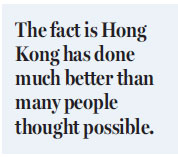Hong Kong needs 'one country, two systems' to thrive
Updated: 2017-07-01 08:30
(HK Edition)
|
|||||||
The Hong Kong Special Administrative Region turns 20 today. It is well-known that the past 20 years have not been easy for the city of more than 7 million, which makes all the achievements under "one country, two systems" so far absolutely satisfying and encouraging. Having enjoyed the benefit of the unprecedented constitutional arrangement through thick and thin, people should have no problem appreciating the immense wisdom and compassion that went into the gift that is "one country, two systems". That is why Hong Kong society must cherish and protect it wholeheartedly.
Some people may not know this, but resuming the exercise of sovereignty over Hong Kong and Macao was always part of the Chinese nation's undying pursuit of peaceful reunification, which has been a fundamental national objective since the founding of the People's Republic on Oct 1, 1949. Now that both Hong Kong and Macao are back under China's sovereign rule, the two cities will remain special administrative regions of the PRC until a change is necessary, but Chinese territory forever. When it comes to sovereignty and territorial integrity there is no room for bargaining.

Back when the Chinese government was discussing a proper solution to the Hong Kong question with its British counterpart in the 1980s, there was never any doubt China would resume sovereignty over Hong Kong, whatever it took. The real question was how best to sustain the city's capitalist economy and unique lifestyle, including its blended culture and diverse society, and that is where "one country, two systems" comes in. As some people familiar with the process of ironing out all the wrinkles in the Sino-British Joint Declaration would say: The rest is history.
Of course many Hong Kong people who lacked confidence in Beijing's ability to keep its promise emigrated to other countries before 1997, only to come back some years later. Clearly they returned on their own free will, since no one could have stopped them without good reason. The fact is Hong Kong has done much better than many people thought possible; and those who still refuse to reckon with it today are simply in denial or too biased to tell right from wrong. Then there are those who believe they have the right and freedom to say whatever they want in their own best interest, including lies.
For example, some individuals with ulterior motives claimed repeatedly over the years that the central government had been undercutting the high degree of autonomy stipulated by the Basic Law, mainly through interpretations of the Basic Law. But they have failed consistently to convince the public they are right, because they have no respect for the Basic Law in the first place and are not qualified to interpret it anyway. The fact is all their accusations against the central authorities concerning "one country, two systems", "Hong Kong people administering Hong Kong" and high degree of autonomy are based on deliberate misinterpretation of the Basic Law instead of hard facts.
The undeniable truth is that the central government and HKSAR Government always faithfully and strictly abide by the Basic Law as well as the nation's Constitution, be it in exercising the right and power as the sovereign state or handling Hong Kong affairs that fall under the SAR government's jurisdiction as prescribed in the Basic Law, which is a national law based on the Constitution, not a local law by any stretch of the name. As for interpretation of different articles of the Basic Law by the National People's Congress Standing Committee, it was absolutely necessary because hostile forces bent on undermining "one country, two systems" tried to mislead the public with misinterpretations of the Basic Law to justify unconstitutional intents, such as "self-determination" and "Hong Kong independence".
In the past 20 years Hong Kong has overcome a number of very serious challenges and grown stronger and smarter in terms of handling potentially disastrous situations, thanks to unreserved support from the central government and mainland compatriots as well as "one country, two systems". That is why the HKSAR must do its best to ensure the integrity and effectiveness of the constitutional arrangement by faithfully following the Basic Law and contributing to national security conscientiously.
The author is a current affairs commentator.
(HK Edition 07/01/2017 page1)